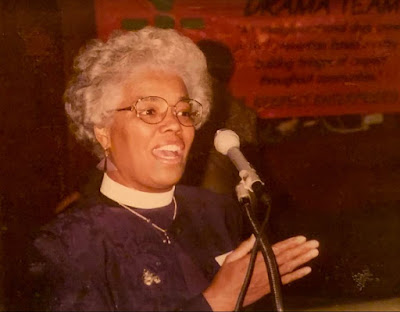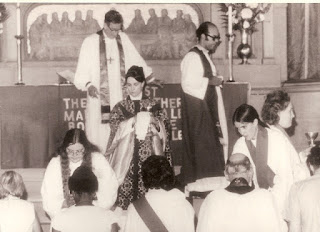 |
| the Rev. Dr. Toni Schiesler |
On this the 46th Anniversary of the ordination of
the Philadelphia Eleven, I want to honor each of those eleven women in the way I
think would most please them: by honoring one of the women who came after them who,
in her own way and in her own time broke her own barriers, not just for
herself, but for other women who came after her.
Mary Antoinette (“Toni”) Schiesler has the distinction of being
the second African American woman to be ordained to the priesthood in the
Episcopal Diocese of Delaware. Her life is a study in overcoming adversity at
every level, not limited to but most definitely including the institutional
church.
Born Carole Virginia Rodez, her mother, Gladyce, was a
singer who aspired to perform with the “Big Bands” of the 1930s. Sara Lawrence-Lightfoot, in
her book I've Known Rivers: Lives of
Loss and Liberation, writes: "Toni remembers sitting on her
grandmother's knees by the radio listening to her mother sing, loving the
mellow, soothing voice. She aches in knowing that her mother had wonderful
talents but was unable to make it as a musician 'because of the
circumstances'."
“The
circumstances” included something that Carole didn’t learn until she was in her
mid-thirties. Carole knew that her mother considered her to be gifted and tried
to nurture her talents, but that she had not wanted to have children. What
she learned was that her mother Gladyce had moved to Chicago to follow her
vocation and sing with a Big Band. While there, she was raped by “a Cuban man
named Rodriguez” and became pregnant. That Cuban man named Rodriguez was her
biological father.
Carole
was raised in poverty by her single mom in her home state of Connecticut,
ostracized by her mother’s family because of the circumstances of her birth as
well as ridiculed by other children because she was so poor. Her mother’s
second husband had a violent temper which matched her mother’s which was
“terrible,” according to Carole. Until they divorced, the family home was
always tumultuous and violent.
 |
| Ordination of The Philadelphia Eleven |
In
the fifth grade, Carole was so far ahead of her peers in school that she was
enrolled as a boarder in St. Francis Academy, a Roman Catholic school for
“colored girls,” where life was stable and she was able to get a good education.
Poverty always haunted her, however, and increased her sense of isolation and loneliness among her mostly middle-class peers. She said, “I always felt inferior because I always felt poor.”
Poverty always haunted her, however, and increased her sense of isolation and loneliness among her mostly middle-class peers. She said, “I always felt inferior because I always felt poor.”
Perhaps
that sense of inferiority compelled her to succeed. Perhaps that was the
function of her natural intelligence. No doubt, it was, at least at times, a combination of both. She excelled in a course in chemistry in
her senior year, which shaped the direction of her academic and professional
career. She graduated from high school
at the top of her class.
Although
she had entered the Academy as an Episcopalian, she converted to Catholicism
after the tenth grade because she was felt she had a vocation to be a nun. At
age 17, she entered the Convent of the Immaculate Conception and was given the
name Mary Antoinette when she became a novice.
She kept that name for the rest of her life.
Toni’s
life as a nun centered around her work as a teacher, but she combined her
ministry with her pursuit for academic credentials. She attended the College of
Notre Dame of Maryland full time during the summer and graduated with a BA in
1967. She went on to attend the University of Tennessee on a Fulbright
Scholarship for an MA in Chemistry. She attended the University of Maryland, earning
a Ph.D. in Education and Chemistry.
When
she returned to the convent, Toni was undecided about her life, and began
looking for ways to take time away from the community which suddenly felt
“claustrophobic”. She consulted with a clinical psychologist who advised her
that her indecision was the source of her anxiety. In 1971, at the
age of thirty-seven and after nineteen years as a nun, she left the religious
order to pursue a career in chemistry.
Soon after she left the convent she met Bob Schiesler, a former Roman Catholic seminarian who had left the seminary and taught school for a while before becoming an Episcopal priest. They were married on October 20, 1973. Once again, controversy surrounded her as Bob was a white man at a time where interracial marriages were still illegal in some states. Her husband was also fourteen years her junior, but Toni said, “He is perfect for me.”
The
religious life always called to Toni, but this time her vocation came to her as
a call to the priesthood in The Episcopal Church. That journey was also
difficult and challenging. The facts are that Toni was ordained to the Diaconate in June
of 1994 at St. Andrew’s Church, Wilmington (Now Saints Andrew and Matthew
“St. SAMs”). She was ordained to the priesthood on June 17, 1995 at St. John’s
Cathedral, Wilmington (now defunct). However, the backstory to those achievements reveals
that she brought into her
relationship with the institutional church. a lifetime of lessons learned with adversity.
 |
| Alison Cheek, Carter Heyward, Jeannette Picard |
Her
husband Bob recalls: “She read for Holy Orders, the Bishop saying, ‘Read
for the GOEs, and if all goes well, you’ll be ordained.’ She did so under the
tutelage of the Chaplain of St. Andrew’s School, Middletown. The Bishop was
astounded when he heard that she had passed all seven areas with glowing
reports. He then said, ‘I don’t know
what to do with this, I think you still need some work.’ So, he required that
she attend Virginia Theological Seminary for a semester, then extended that for
another semester, before he would ordain her a deacon. Once she became a
deacon, the rules changed again. Instead of serving 6 months before becoming
priested, as all of the candidates for the diaconate from the prior year had
done, she was required to serve a full year. As an African American, the
expectation that she should do more, and then more, and more, was not new to
her.”
Toni’s
CV boasts an impressive academic career. To briefly mention some of her
accomplishments, she was Academic VP at Cabrini University and Program
Director of the National Science Foundation under President Carter. She taught
at the University of Maryland and served Dean at University of Maryland School of
Pharmacy. She was also Dean of graduate research at Eastern Michigan University.
She was the senior woman in the administration of Villanova University as Dean
of Graduate Research at the time there.
She also served the church as a trustee of the Diocese of Michigan, a board member of the Philadelphia Theological Institute, a member of executive council and trial court for the Diocese of Delaware, and an executive board member of the Episcopal Women's Caucus. She served as associate to the dean at the Cathedral of St. John in Wilmington.
Tragically,
she did not have long to fulfill her vocation as a priest. On April
9, 1996, she died suddenly of a brain aneurism after collapsing in the office
of her spiritual director. It was Easter Monday, just a few months short of the
first anniversary of her priestly ordination.
In her very brief time as an ordained person, Toni became known not only for her intelligence and academic accomplishment but also for her skills as a pastor and spiritual director. It has been said that when she preached, she shared her experiences as a Black woman. She also
agitated, in her forthright yet gentle way, for fuller inclusion of
African Americans within diocesan leadership. This did not always hold her in good stead with those in power but earned her the respect and admiration of many.
 |
| the Rev. Dr. Toni Schiesler |
The life and ministry of Toni Schiesler continues to inspire those
who read of her ministry and her accomplishments. Her life is the reason the
Philadelphia Eleven and the Washington Four took the risk to pursue their
vocation, to be true to their own calling, of course, but also with a keen
spiritual awareness about the women like Toni Schiesler who would come after
them.
I believe Alla Rene Bozarth, one of the Philadelphia Eleven,
expresses that best in her poem:
Pearls
You
are pearls.
You began
as irritants.
The ocean pushed
your small, nearly
invisible
rough body
through an undetected
crack in the shell.
You got inside.
Happy to have a home
at last
you grew close
to the host,
nuzzling up
to the larger body.
You became
a subject
for diagnosis:
invader, tumor.
Perhaps your parents
were the true invaders
and you were born
in the shell —
no difference —
called an outsider
still.
You were a representative
of the whole
outside world,
a grain of sand,
particle of the Universe,
part of Earth.
You were a growth.
And you did not go away.
You began
as irritants.
The ocean pushed
your small, nearly
invisible
rough body
through an undetected
crack in the shell.
You got inside.
Happy to have a home
at last
you grew close
to the host,
nuzzling up
to the larger body.
You became
a subject
for diagnosis:
invader, tumor.
Perhaps your parents
were the true invaders
and you were born
in the shell —
no difference —
called an outsider
still.
You were a representative
of the whole
outside world,
a grain of sand,
particle of the Universe,
part of Earth.
You were a growth.
And you did not go away.
you grew
so large,
an internal
luminescence,
to the world.
that the shell
could contain
neither you nor itself,
and because of you
the shell Opened itself
 |
| Alla Bozarth |
was seen
and prized,
your variety valued:
precious, precious,
a hard bubble of light:
silver, white, ivory,
or baroque.
If you are a specially
irregular and rough
pearl, named baroque
(for broke) ,
then you reveal
in your own
amazed/amazing
body of light
all the colors
of the Universe.
This poem is from the books, Womanpriest: A Personal Odyssey by
Alla Renée Bozarth, revised edition 1988, distributed by the poet;
Accidental Wisdom by Alla Renée Bozarth, iUniverse 2003 and
the audio cassette Water Women by Alla Renée Bozarth, Wisdom
House 1990. All Rights Reserved.
Sources:
Interactive Timeline of the Ordination of Women https://www.episcopalnewsservice.org/2014/07/28/ordination-timeline/
See the breadth of ordained women in the Episcopal Church in this good chronology going back to 1855: http://arc.episcopalchurch.org/women/two/chronology.htm…
See the breadth of ordained women in the Episcopal Church in this good chronology going back to 1855: http://arc.episcopalchurch.org/women/two/chronology.htm…
Toni’s Obituary The Living Church.
Interviews
with Rev. Robert Schiesler and Ms. Mary Novello
Please consider becoming a member and supporting The Episcopal Women's History Project. Annual dues are only $25. Our Mission Statement: The Episcopal Women’s History Project honors women’s ministries in the Episcopal Church by listening, recording, and continuing to tell their stories.
Please consider becoming a member and supporting The Episcopal Women's History Project. Annual dues are only $25. Our Mission Statement: The Episcopal Women’s History Project honors women’s ministries in the Episcopal Church by listening, recording, and continuing to tell their stories.






















